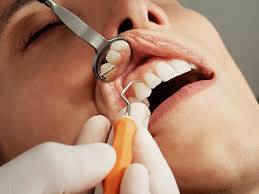Tooth sensitivity is a common condition where teeth become sensitive to temperature changes, certain foods, or touch. It occurs when the protective layer of enamel or cementum (for the roots) is worn away, exposing the underlying dentin, which contains tiny tubules leading to the tooth’s nerves. Here’s an overview of its causes, signs, effects, and solutions:
---
Causes of Tooth Sensitivity
1. Enamel Erosion: Acidic foods, drinks, or acid reflux can wear down enamel, exposing the dentin beneath.
2. Gum Recession: Gum disease, aggressive brushing, or natural aging can cause the gums to recede, exposing the tooth roots.
3. Tooth Decay: Cavities expose dentin, which can make teeth more sensitive.
4. Tooth Grinding (Bruxism): Grinding or clenching teeth can wear down enamel, increasing sensitivity.
5. Cracked or Damaged Teeth: Cracks or chips can expose the inner layers of the tooth, leading to sensitivity.
6. Aggressive Brushing: Brushing too hard with a stiff-bristled toothbrush can wear down enamel and irritate the gums, exposing sensitive areas.
7. Dental Procedures: Certain treatments, like teeth whitening, fillings, or cleanings, can cause temporary sensitivity.
8. Plaque Buildup: Accumulated plaque can irritate the gums and make the teeth more sensitive.
9. Recent Dental Work: Dental work, such as fillings, crowns, or root planing, can lead to temporary sensitivity in some cases.
---
Signs and Symptoms of Tooth Sensitivity
1. Pain When Eating or Drinking: Sharp pain or discomfort when consuming hot, cold, sweet, or acidic foods and beverages.
2. Sensitivity When Brushing: Sensitivity to touch, especially when brushing or flossing near the affected teeth.
3. Discomfort in Cold Weather: In some cases, cold air can trigger pain or discomfort.
4. Localized Pain: The pain may be isolated to one or more teeth, particularly where enamel is worn or gums have receded.
---
Effects of Tooth Sensitivity
1. Difficulty Eating or Drinking: Sensitivity can make it uncomfortable to eat or drink certain foods, which may limit dietary choices.
2. Chronic Discomfort: Prolonged sensitivity can lead to constant, low-grade discomfort, impacting quality of life.
3. Increased Risk of Decay: Sensitive areas are often more prone to decay if enamel erosion continues unchecked.
4. Impact on Oral Hygiene: Some people may avoid brushing sensitive areas properly, which can lead to plaque buildup and further dental issues.
---
Solutions and Treatments for Tooth Sensitivity
1. Desensitizing Toothpaste:
Specialized Toothpaste: Desensitizing toothpaste helps block pain signals from the tooth’s surface to the nerves. Brands like Sensodyne or Colgate Sensitive are formulated for this purpose.
Consistent Use: It can take several weeks of regular use for full results, so use it daily as part of your routine.
2. Fluoride Treatment:
Fluoride Gel or Rinse: Dentists may apply fluoride gel or prescribe a fluoride rinse to strengthen enamel and protect teeth from acid damage.
Fluoride Varnish: In-office fluoride varnish applications can help reduce sensitivity by strengthening enamel in a more concentrated dose.
3. Proper Brushing Technique:
Soft-Bristled Toothbrush: Use a soft-bristled toothbrush and avoid brushing too hard to protect enamel.
Gentle, Circular Motion: Brush gently in circular motions to prevent gum recession and enamel wear.
4. Dietary Adjustments:
Limit Acidic Foods and Drinks: Cut back on acidic foods like citrus, soda, and wine, which can erode enamel.
Use a Straw: Drinking acidic beverages through a straw can minimize direct contact with the teeth.
Rinse with Water: Rinsing with water after consuming acidic foods can help neutralize acids.
5. Treatment for Gum Recession:
Gum Grafting: In cases of significant gum recession, a dentist may recommend gum grafting to cover exposed roots and reduce sensitivity.
Scaling and Root Planing: If gum disease is causing recession, a deep cleaning procedure can help remove plaque and tartar buildup to restore gum health.
6. Avoid Teeth Grinding (Bruxism):
Mouthguard: Wearing a mouthguard at night can protect teeth from grinding-related enamel wear.
Stress Reduction: Reducing stress through techniques like mindfulness, meditation, or counseling may help prevent grinding.
7. Sealants and Bonding:
Bonding Agents: Dentists can apply bonding agents to cover exposed dentin and reduce sensitivity.
Sealants: Dental sealants may be used to cover and protect areas of exposed dentin in some cases.
8. Avoiding Whitening Products:
Limit Teeth Whitening: Overuse of whitening products or home kits can increase sensitivity, especially if used improperly. Consult a dentist before any whitening treatment if you have sensitive teeth.
9. Regular Dental Checkups:
Routine Monitoring: Regular visits to the dentist can help catch signs of wear, decay, or gum recession early, allowing for timely intervention.
Professional Advice: Dentists can offer personalized solutions based on the cause of your sensitivity.
---
Tooth sensitivity can often be managed effectively with a combination of lifestyle changes, proper oral care, and professional treatment. Early intervention and good oral hygiene practices can help minimize discomfort and prevent further enamel loss, allowing you to enjoy a wider range of foods and drinks comfortably.




No comments yet
Be the first to share your thoughts!